Shep Hyken's Blog, page 164
August 2, 2017
Which Customers Do You Want to Keep?
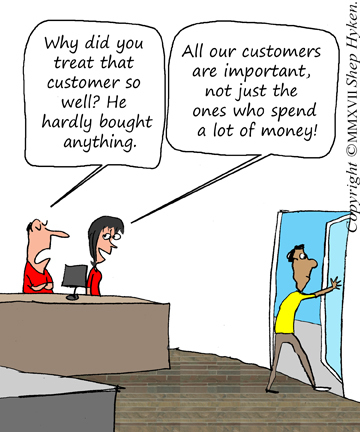 There is an old joke in the dental world that a patient asked his dentist, “Which teeth should I floss?” The dentist answered, “Only the ones you want to keep.” Customer Service is the same.
There is an old joke in the dental world that a patient asked his dentist, “Which teeth should I floss?” The dentist answered, “Only the ones you want to keep.” Customer Service is the same.
All customers are good customers. Okay, maybe not all. Every business has customers – or should I call them former customers – that companies choose not to do business with. But, for the purpose of this article, let’s assume you’re willing to do business with everyone who wants to do business with you.
So, as I was saying, all customers are good customers. Yet, some customers are better than others. What makes them better? They do business with us more often. They buy more. They spend more when they buy. They are easier to work with. There are many reasons.
Yet when trying to gauge a good customer by numbers, we usually look at the dollars they spend. What is your average customer worth? Now, this is important, because to determine your average customer, you need to combine all of your customers. The ones that spend a lot of money and the ones that spend a small amount of money.
Using teeth and dental care as a metaphor, which teeth would you rather keep, the front ones that help you bite, or the back ones that help you chew. Tough choice? The simple answer is, you want to keep them all. Again, same with customers.
Loyal customers tend to be more connected emotionally. Maybe they have a relationship with someone at the company. Maybe it’s the comfort of a predictable and consistent experience that they always have had and know they will get. Many things connect customers to a company beyond product and price.
At the other end, you have your customers who may not see you very often or spend much money with you. But, they still come back every so often. They are good customers, too.
I once bought a dress shirt that was on sale from a salesman at a men’s clothing store. Realizing my purchase was small, I commented, “Maybe next time I’ll see a sport coat or suit I like.” The salesperson smiled and said, “If I had 500 customers just like you, I’d be the happiest salesperson in the store.” He went on to tell me that he likes good customers who walk out of the store happy, regardless of how much they spend, because they come back. He was right. I came back, and I bought a suit. And, I’ve been buying clothes from him ever since.
He figured it out. It wasn’t how much money I spent that first time. It was that I represented one of his customers, regardless of how much or little I bought. So, the point is to take care of all of your customers. The small ones and the big ones. Everyone, regardless of how much they spend, should feel happy, respected and appreciated.
And, by the way, be sure to floss your teeth. All your teeth!
Shep Hyken is a customer service expert, keynote speaker and New York Times bestselling business author. For information contact or www.hyken.com. For information on The Customer Focus™ customer service training programs go to www.thecustomerfocus.com. Follow on Twitter: @Hyken
(Copyright © MMXVII, Shep Hyken)
The post Which Customers Do You Want to Keep? appeared first on Shep Hyken.
August 1, 2017
Amazing Business Radio: Jeff Nicholson
 Jeff Nicholson on What Consumers Know (and Don’t Know) About Artificial Intelligence
Jeff Nicholson on What Consumers Know (and Don’t Know) About Artificial Intelligence How will artificial intelligence (AI) enhance the relationship you have with your customers?
Shep Hyken interviews Jeff Nicholson, the Vice President of CRM Product Marketing at Pegasystems, about how AI technology will help companies serve their customers even better.
First Up:
Shep Hyken’s opening comments focus on artificial intelligence and how it can use data to create meaningful interactions with customers. Once people become more comfortable with AI, they’ll begin to understand how useful it can really be. Currently, there are some common misconceptions that people have about AI, especially the kinds of AI that they are already seeing in their day-to-day lives.
Giveaways:
Click Here to view the PDF of the Pega Study, “What Consumers Really Think About AI: A Global Study” discussed on the episode.
Click Here to view the webinar Shep mentions during the beginning of the Episode with Jeff.
Featured Interview:
Shep begins his interview by asking Jeff Nicholson about Pega’s recent global consumer study, “What Consumers Really Think About AI.” Pega published its study after surveying 6,000 consumers across six countries. AI is poised to transform how customers interact with businesses, but some customers must first overcome some educational and emotional hurdles. They must feel comfortable enough to use AI to its full extent.
Jeff suggests rather than being omnichannel, be channel-less. Don’t focus on the channels individually, but use AI to streamline the customers’ experience across all channels. Jeff provides an example explaining how if you are on amazon.com you can easily transition to any computer, or even their mobile shopping app to continue your shopping with the same consistent experience.
Some key findings from Pega’s Study:
Only 33% of respondents think they use technology with AI, but 71% actually use an AI-powered device or service
70% are fearful of AI, yet 71% are open to businesses using AI with them if it makes life easier
33% said that AI is never going to know them and their preferences as well as a human being
When the respondents were asked, “How do you describe what AI can do?”:
51% said AI could think logically
37% said AI could interpret speech
35% said AI could replicate human interaction
Those are realistic responses, yet some respondents erroneously identified what AI could do:
14% said AI could feel emotion
10% said AI will take over the world
8% said AI controls your mind
Top Takeaways:
AI doesn’t get rid of customer service jobs. It changes them, for the better. With the help of AI, customer service representatives will be able to devote their time to helping customers better, adding value to the relationship.
AI systems will interpret customer data, compare it to customers with similar histories, and work to understand the customer’s mental state. Based on that, AI will recommend to the customer service representative good ways to handle the interaction. This concept is called Next Best Action.
AI will be the employee’s “wingman”, making suggestions for the agent to share with the customer.
About:
Jeff Nicholson is a recognized customer engagement thought leader. Jeff works closely with industry analysts and has been a frequent presenter at industry events on subjects including consumer engagement strategy, customer analytics, digital marketing and customer journey best practice.
Shep Hyken is a customer service and experience expert , “New York Times” best-selling author and your host of Amazing Business Radio.
“A lot of the role of AI is to help you become simpler, to hide the complexity.” – Jeff Nicholson
This episode of Amazing Business Radio with Shep Hyken answers the following questions … and more:
How can artificial intelligence (AI) turn self-service into great service?
How can artificial intelligence (AI) make customer service better?
Do you need to have an omni-channel strategy?
Will artificial intelligence (AI) take away jobs?
What is Next Best Action?
The post Amazing Business Radio: Jeff Nicholson appeared first on Shep Hyken.
July 31, 2017
5 Top Customer Service Articles for the Week of July 31, 2017
Each week I read a number of customer service and experience articles from various online resources. Here are my top five picks from last week. I have added my comment about each article and would like to hear what you think too.
10+ Times Hotels Surprised Everyone With Their Creativity by Sarune Mac
(Bored Panda) If you stay at hotels often, you know that most of them seem to offer the same old thing – mildly friendly reception, a decent bed, and a warm shower. Today, however, we’d like to focus on a few hotels that decided to up their game and take hospitality to the next level.
My Comment: This has been out there a while, but I discovered it just a few days ago. Here are a number of examples of how the hotel industry can deliver better service and a customer experience. Some of these ideas will make you smile – or even laugh out loud!
Why does my business have such angry customers? by John Walls
(Real Business) It’s common knowledge that understanding and fulfilling a consumer’s needs equates to a happier, more satisfied and loyal customer. However, this can be overlooked, or even unwittingly neglected, resulting in angry customers.
My Comment: Why do certain businesses create angry customers? This article sheds some light on the topic with a few reasons it can happen, along with some strategies and tactics on how to avoid them. By the way, it’s usually not the product that causes the customer to become angry.
A Closer Look at the State of NPS for the Technology Sector by Cvetilena Gocheva
(NPS Benchmarks) Today, we will explore some the most prominent technology brands and their Net Promoter® Score achievements. Sit tight and enjoy the ride!
My Comment: My friends at CustomerGauge have come out with another NPS (Net Promoter Score) post featuring benchmarks from the Tech industry. Even if you’re not part of that industry, take a look at what drives these companies’ NPS scores. Apple, with an incredible score of 89, is the darling of customer service, not just for the tech industry, but any industry. Great insights from CustomerGauge.
The Status Quo of Customer Success in SaaS: Stats, Facts, Data, and Japanese Restaurants by Andy Mura
(Userlane) The evolution of SaaS organizations that focus on customer experience and customer success.
My Comment: This article draws some parallels between some of the experiences the author had when dining out at a variety of Japanese restaurants and doing business with software (SaaS) companies. The restaurants didn’t just serve a meal. They created an “event.” The software companies did more than sell software. They created “customer success.” This type of thinking can work for any company. What are you really selling?
Three Easy Ways to Engage Your Customers by Jeff Toister
(Toister Solutions) Here are three ways you can engage your customers that cost little to no money and take just a small amount of effort.
My Comment: Jeff Toister’s articles have been featured in this roundup before. This time he shares three simple ideas on the hot topic of customer engagement.
Shep Hyken is a customer service expert, professional speaker and New York Times bestselling business author. For information contact or www.hyken.com . For information on The Customer Focus™ customer service training programs go to www.thecustomerfocus.com . Follow on Twitter: @Hyken
The post 5 Top Customer Service Articles for the Week of July 31, 2017 appeared first on Shep Hyken.
July 28, 2017
Guest Blog: Becoming a Blockbuster?
This week we feature an article by Ted Janusz who writes about how customers are always looking for a better customer experience. It’s important to stay up to date on new technology and trends in order to keep your customers and attract new ones.
Was this a typical Friday event for you and your family? Would you or your parents drive to your neighborhood Blockbuster store, hoping to get a copy of the latest movie release before they would all be rented? And then you hoped you could watch the film within 48 hours, else you would be charged that dreaded late fee?
Back in 2004, Blockbuster had 60,000 employees, 9,000 stores and appeared invincible. In fact, at one point, a new store was becoming a Blockbuster every 24 hours. But after being slapped with a late fee of $40 on a copy of the movie Apollo 13, Blockbuster customer Reed Hastings decided to do something about it. In 1997, he co-founded Netflix, which would not charge late fees but would eventually stream movies online, and soon Blockbuster disappeared. (Surprisingly, Blockbuster could have bought Hasting’s company in 2000 for $50 million.)
Another example: BlackBerry dominated the business smartphone market. As a result, it dismissed the new iPhone as a “mere consumer toy.” However, the bring your own device to work (BYOD) movement helped to change that. After many years of false starts then attempting to catch up to smartphone market leaders, a new device was just recently introduced, the BlackBerry KEYone, but it is marketed, manufactured, and distributed, not by Blackberry but by TCL.
As a final example, why would any consumer want to go through the time and effort to travel to a mall or other shopping destination, when they can now order just about anything painlessly, with just a few clicks on Amazon or other retail websites? Online sales are expected to grow to more than $400 billion by 2018. That is nearly a half trillion dollars of goods and services that consumers will no longer trudge to brick-and-mortar stores to get.
As a result, retail consultant Howard Davidowitz predicts that up to 50 percent of America’s shopping malls vanish within 15 to 20 years. He expects that only upscale shopping centers that can create a unique customer experience, by providing anchors like Neiman Marcus and Saks Fifth Avenue, will survive.
Malls which depend on anchors like JCPenney and Sears, which are quickly closing stores, are the most likely to die. “Middle-level stores in middle-level malls are going to be extinct because they don’t make sense,” claims Davidowitz. “That’s why we haven’t built a major enclosed mall since 2006.”
On the other hand, Facebook, which has long been the dominant player in the social media space, is apparently not resting on its laurels but is instead listening to its customers. For instance, because of the ease and proliferation of recording and sharing video, Facebook has inserted a feature at the top of the new version of their app. The feature allows you to easily capture Your Story to share with your friends.
The point is that the more our business is successful, the more that we want to keep it the same, and force consumers to continue play by our rules. However, when it comes to the customer experience, consumers are constantly looking for newer, better, faster, cheaper or easier ways of doing things. Are you playing by your rules, or by theirs?
Ted Janusz is a master facilitator with Shepard Presentations and The Customer Focus. He loves to work with people, and it shows. His energy, enthusiasm and expertise will ignite, inform and motivate your audience.
For more articles from Shep Hyken and his guest contributors go to customerserviceblog.com.
Read Shep’s latest Forbes Article: Ann Coulter And Delta Air Lines Clash Over Seat Assignments
The post Guest Blog: Becoming a Blockbuster? appeared first on Shep Hyken.
July 26, 2017
Just Stop It!
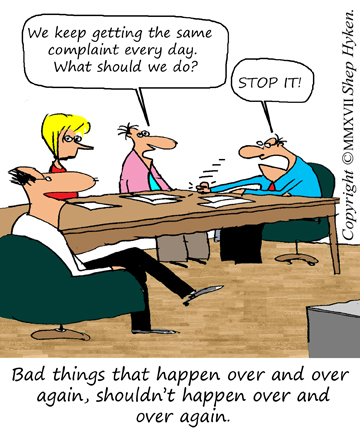 There’s an old joke that goes something like this: A guy goes to the doctor. He raises his arm and complains, “It hurts when I do this.” The doc says, “Then don’t do that.”
There’s an old joke that goes something like this: A guy goes to the doctor. He raises his arm and complains, “It hurts when I do this.” The doc says, “Then don’t do that.”
In other words, “Stop it!”
That reminds me of a very funny video I saw on YouTube that features comedian Bob Newhart. It’s called “Stop It!”. In the video, Bob Newhart is a therapist and his patient is complaining about a problem she is having. She has a fear of being buried alive in a box. Remember, this is a comedy sketch. His solution is to tell her, “Stop it!”
Customer service is the same way. In some of the workshops we present on service, there is an exercise where we ask the audience members to come up with the most common complaints they hear from customers. We also ask them how often these complaints occur. Sometimes I’m amazed when the response is every day – even multiple times throughout the day. That’s when I share the solution. I look at the audience and state, “I have a solution to this problem. Are you ready?” I then pause for dramatic effect and say, “Stop it!”
That gets a laugh from the audience. They know it’s a joke. If it were that simple, they would have already stopped doing whatever was causing the problem. But, it’s a great set up for the conversation on how to eliminate or at least mitigate this problem that causes customers to complain so often.
How many times do we upset a customer with the same processes, policies or rules? If you are hearing the same complaint again and again, realize that there are many other customers who have the same complaint, but just aren’t sharing it with you. The statistic most commonly shared is that in an average business, for every complaint you hear from a customer, there are 26 others that have the same complaint, but choose not to tell you. Even if that stat is half true, that’s still a lot of unhappy customers. You think they are happy because they don’t complain to you. But, they aren’t happy. They may or may not come back. Can you afford to take that chance?
So, have a discussion with your team. If there’s a problem that’s happening repeatedly, and you’re hearing customers frequently complain about it, find out what’s driving that complaint. There has to be a way to make it better. Because something bad that happens over and over again, shouldn’t happen over and over again. So… Stop it!
Shep Hyken is a customer service expert, keynote speaker and New York Times bestselling business author. For information contact or www.hyken.com. For information on The Customer Focus™ customer service training programs go to www.thecustomerfocus.com. Follow on Twitter: @Hyken
(Copyright © MMXVII, Shep Hyken)
The post Just Stop It! appeared first on Shep Hyken.
July 25, 2017
Amazing Business Radio: Chase Clemons
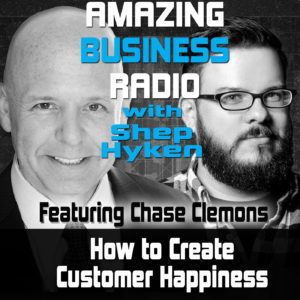 Chase Clemons Discusses How to Create Customer Happiness
Chase Clemons Discusses How to Create Customer Happiness How can we move from just satisfying our customers, to making them truly happy, which results in loyalty?
Shep Hyken interviews Chase Clemons, a highly-experienced customer service professional at Basecamp, who tells us how to go above and beyond for your customers.
First Up:
Shep Hyken’s opening comments focus on how, when your customer calls you, they need to know three things:
That you know them.
That they like the information that you give them and trust that it is accurate.
That when they get off the phone they’ll be able to do what you tell them to do.
If you can do that quickly, or if it takes longer, they don’t care. They need someone they can rely on. As the old saying goes, “People like to do business with companies and people they know, like, and trust.”
Featured Interview:
Shep begins his interview by asking Chase Clemons how he goes above and beyond answering his customers’ questions. Chase explains that when people use Basecamp, it’s not really about Basecamp. It’s about what Basecamp does to make their lives easier. They want to take whatever they are working on, get in, get out, and get back to running their business. So, the more he can help with that the process the better.
“Go the extra little bit,” Chase advises. Be a partner rather than just a business. Find the information that truly solves the customer’s needs, rather than just answering the question that they raise. This includes thinking proactively and resolving issues that may arise later on, before they happen, while assisting them with their initial issue. Solve the short-term problems, but address long-term issues.
Chase also explains that you can be clear and concise, whether on email, a phone call, or live chat, and still be human. The biggest key is to not have a standardized reply for every part of the interaction. Yes, have templates (Chase calls them “snippets”) that you can work with. But those should just be building blocks for creating a personal experience with the customer. The dialog should be unique for each customer.
Top Takeaways:
The best thing you can do for your customers is to surprise them. If they have an issue, after you fix it, and you notice they have been a customer for a long time, give them something. Give them a free month, send them some flowers, chocolates, or a book. Don’t tell them you are going to do it. Let it be a surprise. That’s the next step in getting the loyalty you are after, and establishing and deepening the relationship.
Don’t just resolve the customer’s initial question at face value. Ask questions and dig further to find out the details of their request. This will not only allow you to answer their initial request, but will open the door to resolve other potential issues, and will allow you to make the best suggestions for them as well.
Make sure you take time for yourself. You’ve got to put your oxygen mask on first – meaning you have take care of yourself first or you’ll burn out and you won’t be good to anyone. Chase believes, “Work a good 40 hours a week.” It’s important to make sure you and your employees have a good work-life balance.
About:
Chase Clemons is a hands-on “in the trenches” with his customers in his role as a customer support pro at Basecamp. Basecamp is project management software that helps their clients stay organized as they work through projects. Chase is also the host of the Support Ops podcast, a popular show for people in the customer support industry.
Shep Hyken is a customer service and experience expert , best-selling author and your host of Amazing Business Radio.
“Take the experience and make it something that the customer can truly be happy with, rather than a checking-the-box, yes, I-got-that-done kind of experience.” – Chase Clemons
This episode of Amazing Business Radio with Shep Hyken answers the following questions … and more:
What is the best thing you can do for a customer?
How do you create a human experience for your customers?
How can you create a personalized experience for your customers?
What are some customer service best practices?
How should you answer customer complaints?
Why is a satisfactory, or an average, experience not good enough?
The post Amazing Business Radio: Chase Clemons appeared first on Shep Hyken.
July 24, 2017
5 Top Customer Service Articles for the Week of July 24, 2017
Each week I read a number of customer service and experience articles from various online resources. Here are my top five picks from last week. I have added my comment about each article and would like to hear what you think too.
What do older generations want from customer service? by Roxanne Abercrombie
(CustomerThink) It may surprise you that one in five Twitter users are aged over 50, over 59 per cent of seniors have made an online purchase in the past three months, and a colossal 28 million seniors have a Facebook account. Clearly, digital tools are not just for the younger generation.
My Comment: Some people believe that self-service solutions, live chat and social channels are used by a younger generation. That is far from the truth. One in five people over 50 have a Twitter account. 59% of seniors have made an online purchase in the last three months. The point is, don’t be misled to think customer service solutions driven by technology or social media doesn’t apply to an older generation. They do, and this article has some interesting ideas on how to best work with this generation.
Customer Service Tip: Just Be Nice by George Aveling
(Goerge Aveling) I first heard the phrase “Just Be Nice” when I read a book by Robin Sharma. These 3 simple words, shortened to three letters – JBN – have stuck with me ever since. And that was some years ago!
My Comment: I’ve always joked that I could give a speech on the basics of customer service that would be less than one minute. Three words: Just be nice! Of course, those three words are good, but there is so much more to great customer service than just being nice. But, it’s a great start. The author of this article shares an example of the “Just Be Nice!” concept in action.
5 Fresh Examples of Customer Experience Innovation by Blake Morgan
(Forbes) The best athletes in the world take thoughtful and bold risks in critical moments. Serena is a powerful reminder of how to be a leader in uncertain times. Like Serena’s playing style, companies today must consistently make bold bets on customer experience even in uncertain times.
My Comment: If you’re not constantly thinking about how to improve your customer’s experience, it’s time to start. Here are five approaches with five examples from five different companies to spark some ideas.
3 Slices of Advice When Taking an Escalated Customer Service Call by Jenny Dempsey
(Customer Service Life) You sense an energy shift. The air stiffens as a silent hush falls over the room. A tapping of a finger on a desk echoes. You hear footsteps slowly moving in your direction. You begin to sweat. You have a strong desire to feverishly bolt away from your desk, arms flailing in the air, screaming. You know what lies ahead.
My Comment: The customer is upset and wants to speak to a supervisor. The supervisor knows a conversation is about to start and the other person is upset and possibly angry. How would you approach this interaction? Jenny Dempsey is a veteran of these situations and shares a few word of wisdom on how to deal with this potentially difficult customer situation.
A Billion Reasons Why Loyalty Marketers Need Customer Identity by Mike Sands
(Martech Today) While it might seem easy to get consumers to sign up for your loyalty program, keeping them active and engaged is another story. Columnist Mike Sands explains how a customer identity solution can help.
My Comment: If your organization has a customer loyalty program, you’ll find this article of great interest. Customers are typically members of many loyalty programs – sometimes so many that they forget they are members of some of them. So, how do you stand out? How do you make being a member of your loyalty program worthwhile? Here are a few reasons to consider.
Shep Hyken is a customer service expert, professional speaker and New York Times bestselling business author. For information contact or www.hyken.com . For information on The Customer Focus™ customer service training programs go to www.thecustomerfocus.com . Follow on Twitter: @Hyken
The post 5 Top Customer Service Articles for the Week of July 24, 2017 appeared first on Shep Hyken.
July 21, 2017
Guest Blog: How to Hire Live Chat Agents Who Delight Your Customers
This week we feature an article by Jason Grills about how to use live chat agents properly in order to delight your customers. I believe that as a quick first line of support, live chat is a great alternative. – Shep Hyken
 The implementation of live chat software is an easy task to achieve. The important thing to understand is that it is only a tool. The true value and effectiveness of a live chat software tool lie in the people behind it.
The implementation of live chat software is an easy task to achieve. The important thing to understand is that it is only a tool. The true value and effectiveness of a live chat software tool lie in the people behind it.
This means that you should know how to hire live chat agents who are going to delight your customers. By picking this approach, you can expect a higher number of people returning to your business. It will help you build a more powerful brand over time. Therefore, let’s take a look at things you should pay attention to when hiring live chat agents.
Writing Skills
The agent’s primary means of communication comes down to two different writing skills. If he or she lacks any, they might not be the best choice for your customer support team. Before hiring a person, check the following two skills.
Writing style – Writing style includes grammar correctness and politeness in chat. Both of these elements are important, as grammatically incorrect texts can lead to various misunderstandings, making the communication with the customer harder. It will also show that your brand is not professional, but hires cheap personnel, who are not even capable of forming normally structured sentences.
On the other hand, having a great vocabulary will help your agent greet every customer with respect. Additionally, he or she will be able to more easily solve a problem and help the customer with broader writing skills.
Typing speed – Speed is also an important skill for a live chat customer support agent. He or she are going to be in a better position to deliver help to a person. It might not look that important, but when you scale to a high number of customer support agents, a lot of time can be lost if they do not have good typing speed.
Luckily, checking whether the person has two of these crucial writing skills is easy. You can either create a test with a limited time, or simulate a real life example in which the interviewed agent should provide help to a person.
How Good Are They at Multitasking

Website chat software is increasingly becoming popular because it gives the chance to live chat agents to multitask and help multiple customers at once. However, not all people are good at multitasking, and it is necessary to make sure that the agent you are planning to hire is capable of achieving this task.
The best way to check his or her capabilities (as a live chat agent) is to create a situation in which he or she is going to have to communicate with several mock customers simultaneously, helping them resolve their issues in the best way possible. Once you have tested their skills, making the right choice is going to be easy.
Are They Willing to Continuously Learn
Besides writing and multitasking skills, it is necessary to find an agent who is ready to invest his or her time and learn about new things. The following are a couple of examples he or she should be ready to do, in order to remain a high-quality customer support agent.
Learn about the live chat – Every website chat software is different. There are differentiating features that make some better than others. No matter what you have chosen, the customer support agent needs to put in his or her effort to completely understand how the software works and how to use all of the tools to be the most efficient.
Learn about navigation – It is also important to check whether the customer support agent is ready to learn all about the structure of your website or knowledge base. He or she is going to need to provide help to the customer in the shortest time-frame possible. Therefore, navigation through the website plays an important role in how well he or she is going to perform.
Learn about the product or service – The customer support agent needs to know everything about the product or service you are selling. Over time, you are going to upgrade the software or make new products, and the customer support agent should be motivated to learn about them as well. This is quite important, as this type of dedication is crucial for the customer support agent who can provide complete help to all customers.
Adopt new customer support approaches – Every agent has his or her practices that they believe are the most effective. However, there are always those who perform better than others, and the rest of the team should adopt these practices instead of their own. Additionally, there is a wide range of affordable online courses you could purchase for them, and they should invest time in learning new approaches and including them in their work methodology.
Learn about the accompanying software – As previously mentioned, live chat software comes bundled with a variety of features. One of them includes integration with other software tools. The live chat customer support agent should be capable of learning and understanding how to use other pieces of software that make the live chat tool even more effective.
It is through continuous education and self-improvement that you are going to make your team impeccable. Therefore, pay attention to whether the person you are planning to hire is going to give their best to invest time in their professional advancement.
Previous Customer Support Experience

In all lines of work, experience greatly matters. Customer support is no different. Before you decide to hire a live chat customer support agent, it is necessary to check their previous experience, whether he or she has previously worked on a live chat software.
Taking this step will give you a perfect idea about the amount of training that an agent might possibly need.
Going through all of the above steps will let you pick the right person for the job. Additionally, finding a skilled agent is going to make it easier for you to let him start working immediately. Therefore, test and trial as many people as you can, and only then will you be able to find the right person to whom you can entrust your company’s communication with customers.
Jason Grills is a technical writer currently associated with ProProfs Chat. He enjoys writing about emerging customer support products, trends in customer support industry and the financial impacts of using such tools. In his spare time, Jason likes traveling extensively to learn about new cultures and traditions.
For more articles from Shep Hyken and his guest contributors go to customerserviceblog.com.
Read Shep’s latest Forbes Article: AI And Chatbots Are Transforming The Customer Experience
The post Guest Blog: How to Hire Live Chat Agents Who Delight Your Customers appeared first on Shep Hyken.
July 19, 2017
Do You Trust Your Customers? Do Your Customers Trust You?
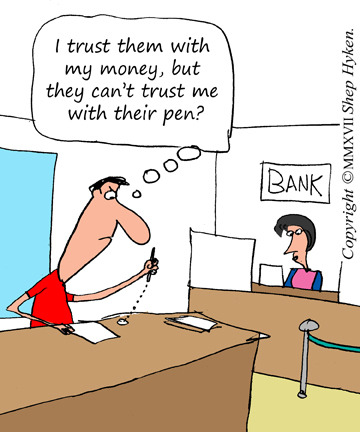 I just returned from Influence 2017, the annual conference put on by the National Speakers Association. My friend and one of the world’s authorities on trust, David Horsager was one of the amazing keynote speakers. He shared an excellent customer service example that can be summed up this way: Trust your customers and they will trust you.
I just returned from Influence 2017, the annual conference put on by the National Speakers Association. My friend and one of the world’s authorities on trust, David Horsager was one of the amazing keynote speakers. He shared an excellent customer service example that can be summed up this way: Trust your customers and they will trust you.
The quick version of the story is this: A farmer owns a fruit and vegetable stand where his customers pay on the honor system. They simply go over to the money jar and put the appropriate amount of money into the jar. If they need change, they make their own. He trusts his customers to do what’s right, and it pays off.
First, the farmer saves money by not having to hire a cashier. Next, he saves money by not having to buy rubber gloves that he has to change every time he touches money and then switches back to touching the produce. That also saves him time, which is, ultimately, money. But most of all, he gets loyal customers that come back, buy more, spend more when they buy and feel valued. That’s because he trusts his customers, and they trust him.
Customers want to be trusted. After all, would you want to do business with a company that feels like they don’t trust you? Are we guilty of having a process or rules that send the message to the customer, “We don’t trust you.”?
A couple of years ago I shared an example that helps make this point. Guitar Center, one of my favorite stores, had a pretty hefty system to prevent shoplifting. As you walked in, they had a desk that had a full-time employee checking equipment that was brought into and out of the store. It turned out that the anti-shoplifting desk was costing dramatically more to manage and staff than the cost of the merchandise they were losing to dishonest customers. And even worse than that, it was also insulting their honest customers. This is an example of punishing all the customers for the sins of a few. The good people at Guitar Center figured this out and eventually did away with their expensive anti-shoplifting system.
You want your customers to trust you enough to buy from you. So, don’t create friction by putting up barriers with a process that makes them feel like you don’t trust them. It will raise a red flag. It will make them feel uncomfortable, and as mentioned, even insulted.
One of Horsager’s favorite lines is, “A lack of trust is your biggest expense.” He’s a smart man. He gets it. Do you?
Shep Hyken is a customer service expert, keynote speaker and New York Times bestselling business author. For information contact or www.hyken.com. For information on The Customer Focus™ customer service training programs go to www.thecustomerfocus.com. Follow on Twitter: @Hyken
(Copyright © MMXVII, Shep Hyken)
The post Do You Trust Your Customers? Do Your Customers Trust You? appeared first on Shep Hyken.
July 18, 2017
Amazing Business Radio: Mason Duchatschek
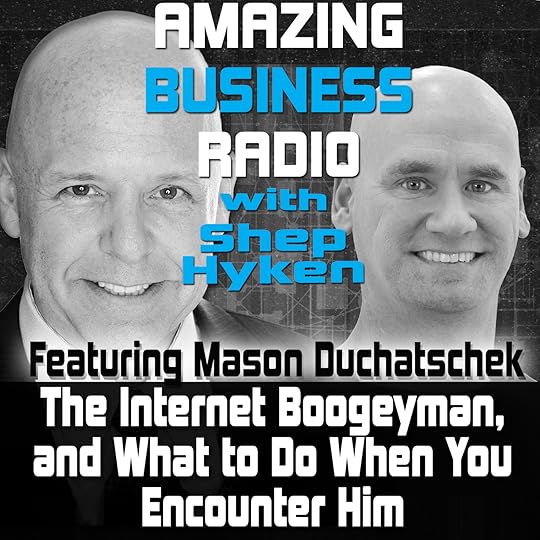 Mason Duchatschek on the Internet Boogeyman, and What to Do When You Encounter Him
Mason Duchatschek on the Internet Boogeyman, and What to Do When You Encounter Him What should you do when someone posts a negative review about your company or your products or services?
Shep Hyken interviews keynote speaker and author Mason Duchatschek on steps you can take to protect your online reputation.
First Up:
Shep Hyken’s opening comments focus on why it is important for any business, not just a retail or online business, to protect their online reputation. There are now online review sites for virtually every industry (even B2B businesses), which although they may not be as visible as Yelp, TripAdvisor or Amazon, they are every bit as influential within that industry. People within each niche can now consult these sites before making a buying decision.
Featured Interview:
Shep begins his interview by asking Mason Duchatschek, “What should you do when a customer posts a negative review – a rant – about you and your company on the Internet?” Mason refers to this reviewer as an “Internet Boogeyman.”
Mason’s response is that the goal is to not have them rant in the first place. The best way to solve problems is stopping them before they occur. And you do that by implementing a four-step process:
Hire good employees.
Train them in customer service.
Have good policies and use good judgement in the absence of policies.
Be nice and do what’s right.
If (or when) an Internet boogeyman rants online, the first step is to respond immediately, either by direct message or by phone. Mason points out that you should never discuss the issue with the Internet boogeyman in a public forum, although you should update the progress toward a resolution on that forum, so that others can see the positive actions you have taken.
Top Takeaways:
Business owners can’t solve problems they don’t know exist. Go to Google Alerts (google.com/alerts) to set up a free, early warning system for your name, company name, and product or service names – any text consumers would type into a search engine to find your company, products, or services. Any time something is posted on the Internet about those items, Google will send you an email alert along with the link so that you can check it out. If people are saying good or bad things about you, you’ll know it, almost in real time. You can monitor and then respond quickly to circumstances, before they cause unnecessary harm to you or your business.
If companies don’t get their online reputation right, customers won’t buy from them, no matter how good their products or services are.
Online reputation is critical; it creates credibility and builds trust. In the absence of a personal relationship, few things (if any) are more important. When people did business face-to-face, they would use their own judgement to determine if they liked and trusted you. Now, in the absence of that personal encounter, they now look to see what others have said online before making a buying decision.
About:
Mason Duchatschek is a #1 bestselling author, entrepreneur and professional speaker. His ideas have been featured in Selling Power, Entrepreneur, The New York Times and Fox News. He is the author of Defeating an Internet Boogeyman: Simple Secrets of Reputation and Crisis Management Using Social Media and Web Marketing Strategy.
Shep Hyken is a customer service and experience expert , New York Times best-selling author and your host of Amazing Business Radio.
“Reputation management is crucial, if you mess it up – people won’t buy from you.” – Mason Duchatschek
This episode of Amazing Business Radio with Shep Hyken answers the following questions … and more:
How can I manage online complaints?
What is the Internet Boogeyman?
How can I protect my online reputation?
How do I find customer complaints online?
Why should I manage my online reputation?
The post Amazing Business Radio: Mason Duchatschek appeared first on Shep Hyken.








